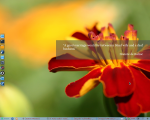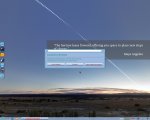uruk gnu/linux 2.0 beta-2
- Vous devez vous identifier ou créer un compte pour écrire des commentaires
It was at times a long, difficult road. But we glad it was long and difficult, because if we hadn’t gone through hell to get there, the lesson might not have been as clear.
Hello
my name is ali and i'm going to tell you a new chapter from uruk gnu / linux story:
It has been said throughout the ages, that there can be no victory, without sacrifice.
after we punished from free software lords we returned to holly mate DE
hoping that punishment will removed from our system.
but we faced some new problems.
we try a lot of Lullabys
like free software song
But nothing has changed
so we give MDM as a liability to free software lord to blase our system
in the end the system Become works well
today in the name of freedom
we release a new iso (beta-2) for uruk gnu / linux:
changelogs:
1. replacing MDM with LightDM with new login customization
2. Update all packages with the latest versions in repository
3- fixing linux-libre key problem
4- fixing freedom issue in mate menu
5. replacing mate control center with uruk control center (written from scratch)
6. intgrate orca with login session window
7. fixing installer icon issue
8. adding somw new packages
with more things you will discover it.
(thanks to every one sending a feedback especialy mangy dog and dave hunt)
Download 32 bit and 64 bit
https://sourceforge.net/projects/urukos/files/2.0/Beta2/
your time is come, you will face a lot of bugs and you must tell us about it
have fun and be free
ali miracle
Bravo & Thank you ;-)
\o/
I'll try this soon; thanks, Uruk Team! Glad to see you've fixed the 'talking login' issue; want a look at the Uruk Control Center.
well done !
It's all about freedom!
;)
Hello,
I have been using Linux for a number of years now, but only just started my journey on the FSF path.
It is good to see a new distribution that is about freedom, they are few and far between.
Best of luck.
Am running Beta 2 on, perhaps, an under-powered machine. Thereare some inconveniences, but The developers seem to have hit the targets mentioned in their announcement of Beta 2.
is possible install cairo-dock in Uruk2.0 (beta2)? Beta 1 version, I can not install cairo-dock
But plank has not application menu like cairo dock? I need an application menu for plank.
I have downloaded uruk 2.0 (Beta 2)- 32 bit, hope that it will use less ram memory than Uruk 2.0_64 (beta 1). I am frustrated. Because they uses same usage of memory.
I knew that 32 bit OS uses less ram space than 64 bit.
------
In normal mode
Uruk 2.0_64 (beta 1) uses > 575mb
Uruk 2.0_i686 (beta 2) uses > > 545mb
---------------
But in previous
Uruk 1.0_64 uses > 450mb
Uruk 1.0_i686 uses > 300mb
---------------
I was happy with Uruk 1.0. But It is not up-to-date now.
--------
Uruk 2.0 up-to-date. But it is suitable for >4gb ram. (my ram= 2gb)
Why do you write that Uruk 2.0 is unsuitable for computers with 2GB of RAM after showing that it uses less than 600MB?
I just installed it on my Aspire1 with 1GB RAM and a new SSD. It's a little bit laggy, but usable. Pretty similar to Trisquel 7 on the same hardware. Maybe even a bit faster.
With Uruk2.0_i686

Shutdown from CLI
# poweroff
Canon Lide 120 was working good using Simple Scan software after install libsane-backends in Uruk 64 bit (beta1). But In 32 bit Uruk (beta2) it is not working correctly. It is working with gimp or xsane. But not working with Simple Scan, gscan2pdf and Skanlite.
Hi MD.Shahidul Islam
It may be more usefull to post on the mailing list & the Uruk Issue tracker :
just send a mail to name at domain with the subject field : subscribe.
or
https://urukproject.org//bt/login_page.php
Are you still using Trisquel's packages, or you have taken your way independently already?
Yes.
Swap partitions either in LVM or standard modes are killing the installation. You may want to remove requirements of existing swaps.
That is wrong. If the RAM is not close to be full, the swap is basically left unused (if you want the kernel to use the swap even less, then set vm.swappiness in /etc/sysctl.conf to a smaller value). If you run out of RAM, the system is slow but, at least, it lets you save your work and close some programs to free memory. In the latter situation, if the system does not have swap, the kernel kills a process. Hopefully not a program on which you have been working for hours without saving...
Also, swap partitions allow you to hibernate the system.
Anyway I have at least 3.72GiB of hardware memories, i.e. RAMs, and not every my systems are equipped with swaps but just work well w/o a need of swaps.
Again: as long as you do not run out of RAM and never hibernates the system, the swap makes no difference. No advantage and no drawback (it does not slow the system, if vm.swappiness is small enough), except the related disk space consumption, typically one or two GB (maybe more if you want to hibernate). It is when you run out out of RAM, for some reason (any reason, e.g., a bug in a program that makes it leak memory in rare circumstances), that you are happy to have some swap.
Just clarifying and finalizing, systems run on hard drives dnt matter with how much swaps or without, but systems run on RAM will be happy to be under more swaps, right?
I suspect you do not understand what "running out of RAM" means. Probably an English problem.
Every program you execute uses some RAM. If you execute many programs, or programs using much RAM (maybe because of memory leaks), then all the RAM may be in use. Once a program tries to store something more, it cannot: there is no room. That is what "running out of RAM" means.
Without a swap partition/file, the kernel kills a process as soon as a program tries to store something but there is no more available RAM. Maybe a program in which you have been using for hours without saving your work! With a swap partition/file, there is still room: on the swap, i.e., on the disk. No program is killed but the system becomes unbearably slow (because the disk is about 100 times slower than the RAM). That lets you the time to save your work and close the program(s) of your choice to free some RAM and get back to a fast system.
Pardon, but using swaps makes my machine feeling less heats for using less RAM than not using swaps. I’ve also tried to hiebrnate my system and backed to my EFI manager, systems under swaps are able to recover session unless reboot is run manually, system w/o swaps enter a selected system using a fresh session.
I am sorry: your English makes little sense to me.
Magic Banana:
>> No program is killed but the system becomes unbearably slow (because the disk is about 100 times slower than the RAM). <<
That's assuming that your internal drive is a magnetic HDD of course. If you have an SSD, I presume that running out of RAM and using the swap would still make the system somewhat slower, but not unbearably slow.
I have both a SATA 3 HDD and a M.2 SSD in my laptop. Benchmarking them with 'hdparm -t' respectively gives 0.142 GB/s and 0.430 GB/s of transfer rates. Benchmarking my DDR4 RAM with memtest86+ gives 21.053.
So the RAM is about 150 faster than my HDD but still about 50 times faster than my SSD: although my swap is on the SSD, the system still feels unbearably slow if it swaps.
I stand corrected. Thanks for the detailed response :)
I put this feedback on the wrong thread, so I'm reporting it on the thread about Uruk-2.0-beta-2 for completeleness. Please feel free to ignore this.
https://trisquel.info/en/forum/uruk-gnulinux-20-alpha
I like the look and feel of Uruk 2.0-beta-2, and I look forward to the final release, but I can't keep using it on my Aspire One (click on my name to see the full specs). Even with the new SSD drive, the performance is just too patchy. If I have more than one browser tab open, I immediately start to have problems, including typing text and nothing happens, or a random selection of the letters I typed appear. Maybe 1GB RAM is just not enough for Uruk 2.0, but ideally a distro like this would run on any box that can run XP, which is what the Aspire One came with when I bought it.
OK, so I'm confused. I just downloaded a fresh copy of beta2 from SourceForge, checked the SHA256, and made a USB installer (see: https://trisquel.info/en/forum/problems-creating-usb-installed-using-trisquel-7). I installed it and got what appeared to be a Mate desktop. This was wierd, because last time I installed what I thought was beta2, it had a Pantheon desktop. Maybe what I actually installed was the alpha or beta1?
Anyway, the new install runs quite well, although I recently upgraded from 1GB RAM to 2GB, so I would expect that. None of the poor performance I had last time. This seems to be sharing a lot of work with Trisquel 8 (Flidas), which is also going to have a Mate desktop, yes? What will be the difference between the final Uruk 2.0 and the final Trisquel 8?
- Vous devez vous identifier ou créer un compte pour écrire des commentaires


